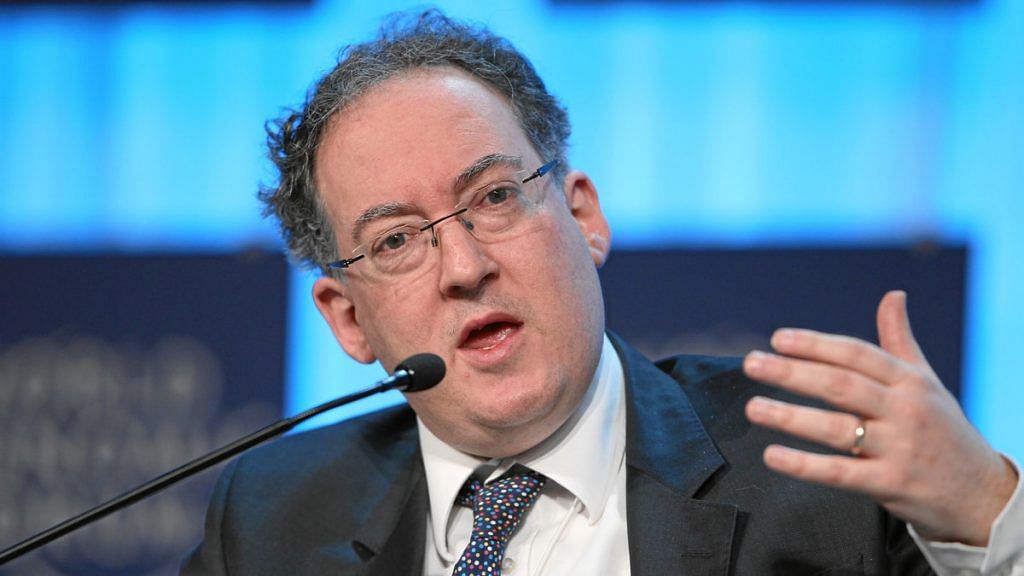New Delhi: China may have underestimated India’s reaction during the Ladakh standoff at the Line of Actual Control, Gideon Rachman, chief foreign affairs commentator, Financial Times, said Thursday at ThePrint’s Off The Cuff. He said Beijing has alienated a very large neighbour.
Speaking to ThePrint’s Editor-in-Chief Shekhar Gupta at the digital OTC, Rachman said, “China may have underestimated the strength of the Indian reaction… There has been a miscalculation of alienating a very large neighbour in the long term, which is the second superpower in Asia… China has become a blackbox.”
Gideon also said the “potential risk of a permanent shift in Indian opinion to viewing China as an adversary”, “pushing” India to be part of the Quadrilateral security dialogue, and losing market share in businesses in India, has been an act of “madness” on the strategic level.
Asked to comment on the ongoing border standoff between India and China, which began in May, Rachman said, “I think that is the single most incomprehensible Chinese action.”
He explained, “They have got enough troubles, they have got the South China Sea… They have this historic conflict which they claim they want to settle with Taiwan and they have the world on their back with Xinjiang…”
Also read: Is China running out of food? Xi Jinping’s ‘Clean Plates Campaign’ is causing rare anxiety
On US and China
In view of the uncertainty in the US over the November presidential elections, Rachman said, “What happens in the US elections is absolutely fundamental in terms of both strategic terms and what the US represents.”
Rachman predicted that if US President Donald Trump gets re-elected, “further estrangement” between the US and the European Union could be expected.
If Democratic candidate Joe Biden gets elected, Rachman said, “It won’t go back to the way it was before Trump. America can’t sort of ‘disinvent’ that era but nonetheless there would be an assertion of alliances.”
Asked about how this could concern India, Rachman said, “India is probably the country that is less likely to be affected by the change because I think successive American presidents — (George W.) Bush, (Barack) Obama, Trump and now Biden — will see India as an absolutely critical counterweight to China.”
He added, “China, even if it is unstable domestically, may become harder to deal with internationally.”
Rachman added that the two biggest strategic issues for the world are what’s happening in the US and in China, and the relationship between the two.
“The breakdown of the US-China relationship will have implications for everybody because the whole system of economic globalisation has been built around the US-Chinese relationship,” he said.
Also read: Arab states aren’t backing Trump’s Iran snapback strategy
On Modi and Biden
Speaking about the prospects of a relationship between Prime Minister Narendra Modi and Biden, Rachman said, “Biden is a retail politician. He is the kind of person who will look to create a personal bond, possibly more than the rather chilly former president Barack Obama and the very erratic President Trump.”
He added, “There’s more of a chance of a close Biden-Modi relationship because they are both people who look to build a personal relationship.”
Parallels between Erdogan & Modi
Rachman also highlighted two events that unfolded around the same time this month — the conversion of Hagia Sophia into a mosque in Turkey by President Recep Tayyip Erdogan, and the groundbreaking ceremony performed by PM Modi for the Ram Temple construction in Ayodhya.
“The broader project that both men were doing have similarities. They are both uneasy with the secular foundations of the states they inherited or became leaders of,” said Rachman.
“They are both strongmen leaders who have associated themselves with the rejuvenation of the nation with faith rather than some kind of cultural heritage,” he added.
Rachman also said they are both “unpopular” with liberal elites and “draw strength” from middle class and lower middle class from outside their capital cities.
“Erdogan is turning Turkey back into a much more consciously Islamic state and it seems to me that there are strong parallels with what Modi is doing in India,” Rachman added.
Also read: Pompeo rebukes allies on Iran, demands UN reimpose global sanctions
